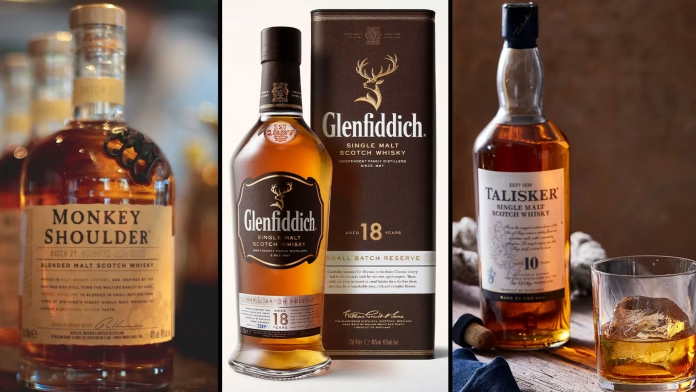Hello, beverage lovers! You ask what single-malt whisky is, then. It’s not a sophisticated moniker for a lonesome guy in a pub, no sir, I tell you! Single malt whisky is a specific variety of whisky produced by only one distillery, entirely from malted barley. You know, it’s like a one-man band. It has all it requires in one location to create wonderful music. You might now be asking why single malt whisky is such a huge deal. Hey, let me tell you, it’s smooth and elegant, like the James Bond of whiskies. It has a rich, deep flavor that is ideal for enjoying alone or with friends on a chilly evening.
If you’re looking for a high-quality whiskey with a rich history and a delicious flavor, you can’t go wrong with single malt whiskey. It is widely regarded as one of the finest spirits in the world and is enjoyed by connoisseurs all over the globe. While many single malt whiskies are available at a reasonable price, others can be incredibly expensive, with some bottles costing thousands of dollars. So why are some single malt whiskies costlier than others? Let’s explore this in detail.
Longevity
One of the most significant factors that contribute to the cost of single malt whisky is its age. The longer the whisky has been aged in barrels, the more expensive it is likely to be. Whisky ages in oak barrels and the flavor, aroma, and color of the liquid evolve over time as it interacts with the wood. As a result, older whiskies are often more complex, flavorful, and smooth than younger ones.
For example, The Macallan 18-Year-Old Sherry Oak is a single malt whisky that is aged for 18 years in sherry oak casks. The extended aging process gives the whisky a rich, fruity flavor with notes of dark chocolate, dried fruits, and vanilla. The Macallan 18-Year-Old Sherry Oak is one of the costlier whiskies, with a price tag of around $300.
Price of Rarity
Another factor that contributes to the cost of single malt whisky is its rarity. Some whiskies are produced in limited quantities, making them difficult to find and highly sought after by collectors. These whiskies are often released in small batches or as limited editions, which can drive up their price.
For example, The Balvenie 50-Year-Old is a single malt whisky that is incredibly rare and limited in quantity. It is aged for 50 years in a combination of European oak sherry hogsheads and American oak bourbon barrels. The Balvenie 50-Year-Old has a price tag of around $40,000, making it one of the most expensive single malt whiskies in the world.
Tedious Production process
The production process can also influence the cost of single-malt whisky. Some distilleries use traditional methods of production, which can be more time-consuming and labor-intensive than modern methods. These traditional methods often result in a higher-quality product, which can be reflected in the price.
For example, Highland Park is a single malt whisky that is produced using traditional methods on the Orkney Islands in Scotland. The whisky is made using locally sourced barley and peat, which gives it a distinctive smoky flavor. Highland Park is considered one of the finest single malt whiskies in the world, and its cost is reflective of the quality and traditional production methods used.
Marketing and Branding
The marketing and branding of a single malt whisky can also impact its price. Some distilleries invest heavily in marketing and promoting their whiskies, which can increase their popularity and demand. As a result, the price of the whisky can increase.
For example, The Glenlivet is a single malt whisky that is heavily marketed and promoted as a premium brand. The distillery has invested in advertising campaigns and events to create a perception of luxury and exclusivity around the brand. The Glenlivet is considered one of the most popular and well-known single malt whiskies in the world, and its price reflects the demand created by its marketing and branding efforts.
The best single malt whiskies in the world are often the result of careful attention to these factors, and the price reflects the time, effort, and expertise that goes into creating them. Whether you are a whisky connoisseur or a casual drinker these key differentiators will help you pick your next best purchase.





